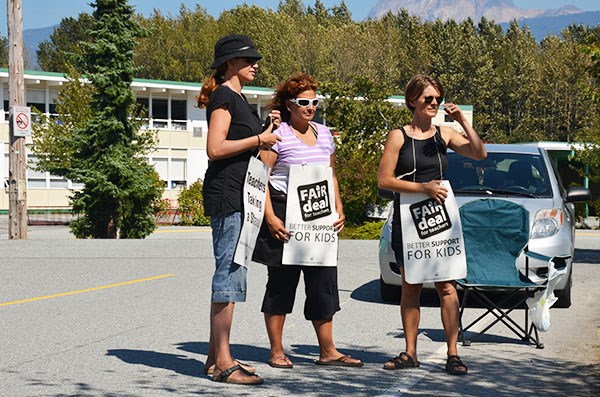More than 30,000 B.C. teachers’ backed their union’s call to drop pickets if the provincial government agrees to hand over the ongoing wage and class size dispute over to a third party.
On Wednesday, Sept. 10, the British Columbia Teachers’ Federation (BCTF) held a vote asking their members whether they would support ending the teachers’ strike if the government entered binding arbitration. The answer was a resounding “yes” with 99.4 per cent of teachers voting in favour.
“Classes could start this week. Children could be learning,” BCTF president Jim Iker told media at a press conference on Wednesday. “Unfortunately tonight, there is a single group of people standing in the way of schools opening their doors tomorrow. The B.C. Liberal government’s refusal to accept binding arbitration is now the only reason children won’t be back in class.”
Last weekend, B.C.’s education minister Peter Fassbender said the government does not support binding arbitration. He let it be known he was not a “fan” of binding arbitration, stressing the drawbacks of handing the teachers’ dispute to a third party.
However the settlement is reached, it needs to be in a manner that is responsible to all sectors of the community, including taxpayers, Fassbender said. The BCTF’s demands need to be “realistic” and “affordable,” he noted. The provincial government has stated from the beginning that officials won’t raise taxes to serve one union’s demands, he noted.
The BCTF is proposing binding arbitration to settle compensation, benefits and preparation issues. The federation is asking that the government leave matters currently before the court, and related to the court ruling, to the courts.
B.C. teachers have been without a contract for more than a year. The BCTF is asking for a eight per cent wage increase. The union is aiming to secure a $5,000 signing bonus per full-time teacher.
BCTF is asking that the government improve its health benefits plan, such as increased massage coverage and inclusion of fertility drugs. The union is also asking for the government to double the amount of preparation time teachers’ get — an amount that currently sits at 90 minutes.
This move alone would cost the government more than $100-million to pay for the extra teachers to fill in for their co-workers during preparation time, government officials stated. Government officials also argue that when wages, benefits and hour reductions are added up, the BCTF is asking for an 11.2 per cent increase — double what “every other public sector union has settled for,” Fassbender noted.
B.C.’s finance minister Mike de Jong stated residents’ property taxes would need to increase $200 on average to cover the union’s demands.



